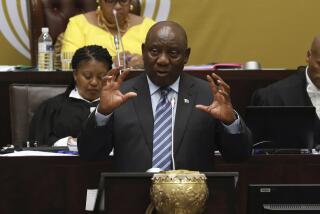NEWS ANALYSIS : Mandela’s Biggest Challenge: His Estranged Wife
- Share via
JOHANNESBURG, South Africa — Nelson Mandela is facing his most serious challenge since he was elected president last spring. It’s neither a brutal race war nor bitter economic collapse, as many once feared.
The problem is his estranged wife, Winnie Mandela. They separated in April, 1992. But they now appear on a political collision course.
In a relationship as public and as tortured as Britain’s Charles and Diana, both are revered by millions of blacks. But while the president is widely respected as an international statesman and model of probity, his wife is increasingly regarded as a national embarrassment and model of misbehavior.
And as often happens in broken marriages, neither partner has shown particularly admirable judgment in the heat of battle.
Long used to flouting authority under apartheid, Mrs. Mandela twice showed public disloyalty in the last two weeks to the husband-president in whose Cabinet she serves as a deputy minister for arts, culture, science and technology.
First, she publicly accused his government of being inattentive to racism. The president stayed quiet after headlines accused her of misusing donor money, an illegal diamond buying spree in Angola, using her government office to launch her daughter’s company and other questionable business dealings.
But her attack--protected under the South African constitution as free speech--drew his wrath.
Aides had to restrain him from firing her. Instead, he angrily demanded that she quit or give a retraction and public apology. She gave two--after he rejected the first as insufficiently contrite.
As that storm was settling, Mrs. Mandela disobeyed the president again by jetting off for a film festival in Burkina Faso and an official tour of West Africa.
A spokesman said Mandela had denied authorization for the 10-day trip and was “hopping mad” when she left anyway.
On Thursday, Mrs. Mandela flew home to face the most serious scandal since she was convicted of kidnaping in 1991.
This time, police--commanded by her husband’s appointees--have announced she is a target in the first major investigation into alleged fraud and corruption in the new government.
Mrs. Mandela rushed by waiting reporters at the airport without a word. The president had a harder time avoiding the touchy topic. Despite tough talk recently about stamping out government graft, he gave no indication that he planned to suspend or fire her from the Cabinet while the probe proceeds.
“I can’t act merely on allegations,” he told reporters in Cape Town. “When these allegations are proved, we will act at that stage.”
Mandela added that it would be improper for him to interfere with the investigation.
“I would not interfere even if they raided my own house,” he said.
He said Thabo Mbeki, his deputy president and chief trouble-shooter, will meet his wife and report back to him after Mbeki returns Saturday from Washington. Many still expect Mrs. Mandela to get the ax.
“Mandela is first a politician and second a distressed husband,” said Tom Lodge, a political scientist at the University of the Witwatersrand. “God knows why it’s taken him so long to get rid of her.”
To be sure, Mrs. Mandela has not been charged with a crime. Prosecutors said they may need six weeks to examine documents, computers and other records seized from her home and the office of an anti-poverty foundation that she founded.
Police say she used the group as a front to channel bribes and kickbacks.
But Mandela’s reluctance to take action against the loose cannon in his Cabinet, or several other prominent African National Congress leaders linked to financial irregularities, mirrors his government’s woeful inability to fulfill its campaign pledges.
After 10 months in office, the government’s much-publicized reconstruction and development program has built only 878 low-income homes and has yet to create jobs in a country with up to 50% black unemployment, Cabinet ministers conceded in briefings last week.
Lodge said the government’s disappointing performance to date is the strongest weapon for radical populists such as Mrs. Mandela.
Her troubles with the law have not dented her popularity in black townships and squatter camps, where she is hailed as a heroine of the liberation struggle.
“Winnie stops being dangerous once the government starts delivering benefits,” Lodge said. “And if they don’t deliver benefits soon, they’re going to be in trouble anyway.”
More to Read
Sign up for Essential California
The most important California stories and recommendations in your inbox every morning.
You may occasionally receive promotional content from the Los Angeles Times.














